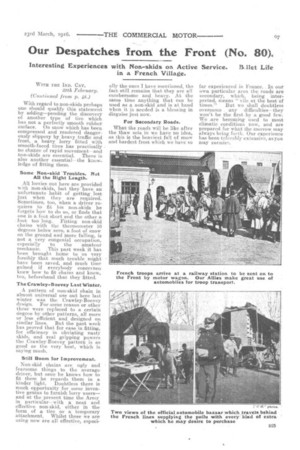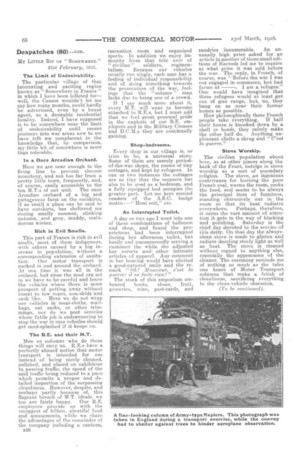Our Despatches from the Front (No. 80)IC
Page 5

Page 6

If you've noticed an error in this article please click here to report it so we can fix it.
Interesting Experiences with Non-skids on Active Service. Bidet Life in a French Village.
WITII THE TED. CAI.
'29th February.
(Continued from p. 48.) With regard to non-skids perhaps one should qualify this statement by adding—pending the discovery of another type of tire which has not a perfectly smooth rubber surface. On snow which has been compressed and rendered dangerously slippery by heavy traffic and frost, a heavy lorry fitted with smooth-faced tires has practically no chance of rapid movement--and non-skids are essential. There is also another essential--the knowledge of fitting them.
Some Non-skid 'Troubles. Not All the Right Length.
All lorries out here are provided with non-skids, but they have an unfortunate habit of getting lost just when they are required. Sometimes, too, when a driver requires to fit his non-skids he forgets how to do so, or finds that one is a foot short and the other a
• foot too long. Fitting non-skid chains with the thermometer 10 degrees below zero, a foot of snow on the ground and more falling, is not a very congenial occupation, especially to the amateur mechanic. This past week it has been brought home to us very forcibly that much trouble might have been saved, and much time gained • if everybody concernen knew how to fit chains and knew, too, beforehand that they fitted.
The CrawleyB oevey Last Winter.
A pattern of non-skicl chain in almost universal use out here last winter was the Cra,wley-Boevey design. For some reason or other these were replaced to a certain degree by other patterns, all more or less efficient and designed on similar lines. But the past week has proved that for ease in fitting, for efficiency in obviating nasty skids, and real gripping powers the Crawley-Boevey pattern is as good as the very best, which is saying much.
Still Room for Improvement.
Non-skid chains are ugly and fearsome things to the average driver, but once he knows how to fit them he regards them in a
kinder light. Doubtless there is much opportunity for some inventive genius to furnish lorry users— and at the present time the Army in particular—with a neat and effective non-skid, either in the form of a tire or a temporary attachment. Whilst those we are using now are all effective, especi
ally the ones I have mentioned, the fact still remains that they are all cumbersome and heavy. At the same time anything that can be used as a non-skid and is at hand when it. is needed is a blessing in disguise just now.
For Secondary Roads.
Whatthe roads will be like after the thaw sets in we have no idea, as this is the heaviest fall of snow and hardest frost which we have so far experienced in France.. In our own particular area the roads are secondary, which, being inter preted, means "vile at the best Of times." But we shall doubtleSS overcome any difficulties—they -won't be the first by a good few: We „are becoming used to most climatic conditions now, and are prepared for what the morrow may always bring forth. Our experience has been tolerably extensiw, as you may surimso.
MY LITTLE Br' Or "SOMEWHERE." 21st February, 1916.
The Limit of Undesirability.
The particular village of that interesting and exciting region known as Somewhere in France" in which I have been billeted for— well, the Censor wouldn't let me say how many months, could hardly be advertised, even by a house agent, as a desirable residential locality. Indeed, I have supposed it to be somewhere near the limit of undesirability until recent journeys into war areas new to me have left me complacent in the knowledge that, by comparison, my little bit of somewhere is more than tolerable.
In a Once Arcadian Orchard.
Here we are near enough to the firing line to prevent chronic monotony, and not too far from a pretty little town, frequently, and, of course, easily accessible to the ten M.T.s of our unit. The once Arcadian orchard of a big and pictuliesque farm on the outskirts, if so small a place can be said to have outskirts, has sheltered me during smelly summer, stinking autumn, and grey, muddy, malodorous. winter.
Rich in Evil Smells.
This part of France is rich in evil smells, most of them indigenous, with others caused by a big increase in population, without a corresponding extension of sanitation. Our motor transport is parked in and around the orchard. At one time it was all in the orchard, but since the mud era set in we have to be careful and leave the vehicles where there is some prospect of getting away without resort to tow ropes, non-skids and such like. Here we do not wrap our vehicles in meat-cloths, mailbags, oat sacks, or other trimmings, nor do we post sentries whose futile lob is endeavouring to stop the war in case vehicles should get mud-splashed if it keeps on.
The R.E. and their M.T.
Men on columns who do these things will envy us. R.E.s have a perfectly absurd notion that motor transport is intended for use instead of being nicely cleaned, polished, and placed on exhibition to passing traffic, the speed of the said traffic being reduced to a pace which Permits a proper and detailed inspection of the surpassing cleanliness. However, despite, and perhaps partly because of, this flagrant breach of M.T. ideals. we ten are fairly happy. Our R.E. employers provide us with the smuggest of billets, plentiful food and amusements, while we share the advantages Of the remainder of the company including a canteen, B26 recreation room and organized sports. In addition we enjoy immunity from that bete noir of
" civilian" soldiers, regimentalism. Because our vehicles usually run singly, each man has a feeling of individual responsibility and of doing something towards the prosecution of the war, feelings that the "column" man lacks due to being one of a crowd.
If I say much more about it, every M.T. will want to become attached to R.E.s, but I must add that we feel great personal pride in the exploits of our R.E. employers and in the Military Crosses and D.C.M.s they are continually gaining.
Shop-bedrooms.
Every shop in our village is, or tries to be, a universal store. Some of them are merely periodof-the-war shops, the rooms of tiny cottages, and kept by refugees. In one or two instances the cottages are so tiny that the magasin has also to be used as a bedroom, and a fully equipped bed occupies the greater part. Let me here remind readers. of the A.S.C. badge motto Honi soit," etc.
An Interrupted Toilet.
A day or two ago I went into one of these combinations of bedroom and shop, and found the proprietress had been interrupted during her afternoon toilet,. but busily and unconcernedly serving a customer the while she adjusted her corsets and' other intimate articles of apparel. .Any comment in her hearing would have elicited a good-natured smile and the remark "Oh! Monsieur. c'est la guerre: ii ne faite rien!"
The stock of this emporium embraced boots, shoo, fruit, groceries, wine, post-cards, and sundries innumerable. An unusually high price asked for an article in another of those small editions of Harrods led me to inquire at what price it was sold before the war. The reply, in French, of course, was "Before the war I was not engaged in commerce, but had
farms at . I am a refugee." One would have imagined that these refugees would at least get out of gun range, but, no, they hang on as near their former homes as .possible.
How philosophically these French people take everything. If half their house is knocked down by a shell or bomb, they calmly make the other half do. Anything unpleasant elicits a shrug and "C'est la guerre."
Stove Worship.
The civilian population' about here, as at other places along the back of the Front, indulge in stove worship as a sort of secondary religion. The stove, an ingenious contrivance for burning the poor French coal, warms the room, cooks the food, and seems to be always the principal item of furniture standing obtrusively out in the room so that. its heat radiates everywhere. Perhaps, therefore, it earns the vast amount of attention it gets in the way of blacking and polishing. Saturday is the chief day devoted to the service of this deity. On that day the alwaysclean stove is made to glisten and radiate dazzling steely light as well as heat. The stove is cleaned without regard to anything else, especially the appearance of the cleaner. The ceremony reminds me of nothing so much as the tales one hears of Motor Transport columns that make a fetish of cleanliness, sacrificing everything to the clean-vehicle obsession.




















